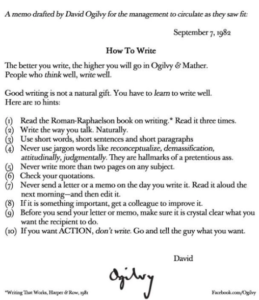David Olgilvy was right.
The better you write, the higher you will go.
That’s almost an exact quote from a famous memo he sent to employees years ago (see below).

He also made another statement I wholeheartedly agree with: “People who think well, write well.”
And we know the best people at the top of agencies and companies are good *thinkers.” That starts with writing.
Not the ability to create awesome TikTok videos.
Not the ability to connect with younger audiences via emojis.
Not the ability to play off memes successfully on Insta.
No, long-term success in our industry, whether it’s comms, marketing or social media, starts with writing.
And again Ogilvy nailed it: “Good writing is not a natural gift. You have to learn to write well.”
I can attest. I wasn’t the best writer earlier in my life. I *liked* to write. I started an underground newspaper in high school. I wrote for my college newspaper. I love to write. But early on, I wasn’t very good at it.
It really wasn’t until I started my blog that my writing took off. Then, I started to write 2-3 times a week. Every week. For the last 13 years. 1,500 blog posts later, I’m a much better writer–and thinker. Why? One word: Practice.
So, we can all be better writers. And, as a result, thinkers and leaders. It just takes practice.
And I want to go back to Ogilvy because some of his “hints” from his original memo still ring true today:
1 – “Write the way you talk. Naturally.”
One of the things I was frustrated with as a corporate communicator earlier in my career was the way people wrote. When writing corporate memos, many used words like “Moreover”, “synergy” and “drill down.” If I heard someone use the word “moreover” in a sentence at a bar or party, I would laugh out loud very, very loudly. And so would you. Because people don’t talk that way! Execs and many other leaders feel the need to use big words in their memos and articles because it makes them sound impressive. Not so. First, your audience won’t understand what you’re talking about if you’re using words they don’t understand. And second, it doesn’t make you sound smart–it makes you sound pompous. If you’re trying to connect with your audience and share meaningful insights and advice, you’re much better off doing it in language everyone can understand. And in an easy-going, plain-speak way.
2 – “Use short words, short sentences and short paragraphs.”
One literary device many popular fiction authors will use is the short paragraph. It keeps readers interested and keeps them turning the page. And, it’s much easier to consume than longer paragraphs and chapters. Result: More readers! This is exactly true for everything we write, too. Blog posts. Social posts. White papers. News releases. You name it, shorter paragraphs and shorter sentences will always win. They’re easier to read. And they’re more visually pleasing to the eye (not as intimidating). In a world where seemingly fewer people are reading, we need to make it as easy as possible to convince these people to consume our messages–shorter everything is part of that path.
3 – “Never use jargon words like reconceptualize, demassification, attitudinally and judgmentally. They are hallmarks of a pretentious ass.”
I just love the “pretentious ass” inclusion in this on by Ogilvy! But you know what? It’s true. Jargon is rarely your friend when it comes to writing. Instead, use easy-to-understand words that easily communicate what you’re trying to say. For example, instead of “I’m not sure we have the bandwidth for this project” you would say “I’m not sure we have the time or resources right now for this project.” Go back to point #1 above–write like you talk!
4 – “Never write more than 2 pages on any subject.”
Probably more true in 2022 than when Ogilvy wrote this memo 30+ years ago. Mostly because people’s attention spans are shorter than ever. But the point is still the same: Brevity is everything.
5 – “Never send a letter or a memo on the day you write it. Read it aloud the next morning–and then edit it.”
I love the phrase, “write hot, edit cold” but this is saying essentially the same thing. Write when you have momentum and passion and ideas. Then sit on it 24 hours (if you can; if not, even just a couple hours will accomplish the same thing) and edit cold. You just want to put some space from that initial draft and you putting on your cold, hard, dispassionate editing cap.

0 Comments